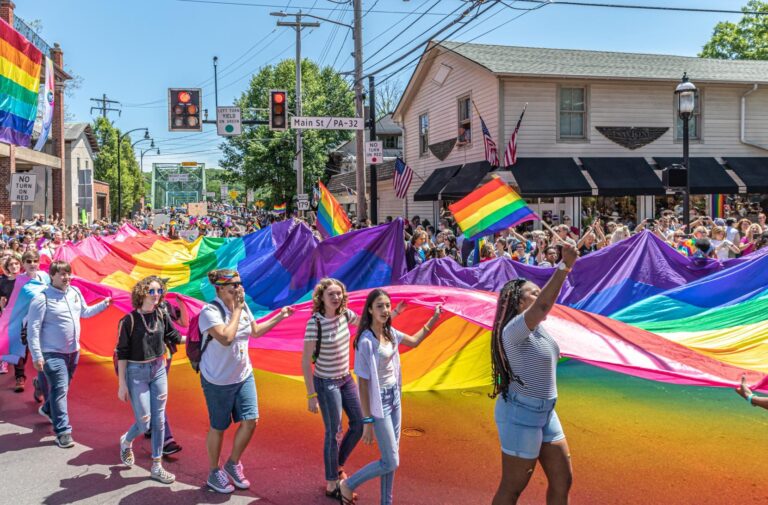Strengthening Hate Crime Laws: Pennsylvania’s LGBTQ+ Community Calls for Urgent Legal Reforms
Rising Hate Crimes Spark Demand for Robust LGBTQ+ Protections in Pennsylvania
In Pennsylvania, the LGBTQ+ community is intensifying efforts to push for more stringent hate crime laws amid a troubling surge in violence and discrimination based on sexual orientation and gender identity. Activists and advocacy organizations stress the importance of enacting comprehensive legislation that not only increases penalties for offenders but also promotes preventive education and awareness campaigns. Recent data from statewide LGBTQ+ rights groups reveal a consistent upward trend in reported hate crimes, especially in metropolitan areas like Philadelphia and Pittsburgh. Community leaders argue that without stronger legal safeguards, LGBTQ+ individuals remain vulnerable to ongoing threats and injustices.
Advocacy groups are calling for several key reforms, including:
- Explicit inclusion of all LGBTQ+ identities within hate crime statutes
- Mandatory bias and sensitivity training for all law enforcement personnel
- Increased funding for victim assistance programs and community engagement initiatives
- Statewide public education efforts to dismantle stigma and promote inclusivity
| Year | Reported Hate Crimes | Year-over-Year Increase |
|---|---|---|
| 2021 | 45 | ‚ÄĒ |
| 2022 | 63 | 40% |
| 2023 | 89 | 41% |
Identifying Shortcomings in Pennsylvania’s Current Hate Crime Framework
Local leaders and advocates highlight significant deficiencies in Pennsylvania’s existing hate crime laws, which often fail to adequately protect LGBTQ+ individuals. The absence of clear, inclusive language in statutes results in many hate crimes going unreported or improperly prosecuted. Additionally, inconsistent law enforcement training across counties contributes to uneven application of these laws, undermining victims’ access to justice.
During recent community discussions, several critical issues were pinpointed as barriers to effective protection:
- Ambiguous legal terminology that does not fully encompass the spectrum of LGBTQ+ targeted offenses
- Insufficient data collection by police departments, leading to incomplete statewide hate crime statistics
- Limited resources and specialized training for first responders and prosecutors handling bias-motivated cases
| Challenge | Consequence | Recommended Solution |
|---|---|---|
| Unclear Statutes | Underreporting and misclassification of crimes | Revise and clarify legal definitions |
| Inconsistent Enforcement | Unequal prosecution outcomes | Implement standardized law enforcement training |
| Data Deficiencies | Policy gaps and lack of targeted interventions | Mandate comprehensive hate crime reporting |
Enhancing Law Enforcement Training and Accountability to Build Community Trust
Advocates and civil rights groups are pressing for the introduction of mandatory, in-depth training programs for police officers across Pennsylvania. These programs aim to improve understanding of the unique challenges faced by LGBTQ+ individuals, focusing on recognizing bias, cultural sensitivity, and appropriate responses to reports of harassment or violence. Such education is seen as vital to fostering trust between law enforcement and marginalized communities, which is crucial for effective reporting and prosecution of hate crimes.
In addition to training, there is a strong call for enhanced accountability mechanisms to ensure law enforcement agencies rigorously follow hate crime investigation protocols. Proposed reforms include:
- Establishment of independent oversight committees to review hate crime case handling
- Regular public disclosure of investigation progress and outcomes
- Clear disciplinary procedures for officers exhibiting negligence or bias
Evidence from pilot initiatives in neighboring states demonstrates the benefits of such reforms:
| State | Training Completion Rate | Hate Crime Case Clearance Rate | Increase in Community Trust |
|---|---|---|---|
| New Jersey | 92% | 78% | +25% |
| Delaware | 88% | 74% | +22% |
Experts suggest that adopting similar comprehensive training and accountability frameworks in Pennsylvania could markedly improve law enforcement responsiveness and create a safer environment for LGBTQ+ residents statewide.
Legal Experts Advocate for Broader Hate Crime Definitions and Harsher Penalties
Legal professionals and LGBTQ+ advocates contend that Pennsylvania’s current hate crime laws inadequately address the complexities of violence targeting sexual orientation and gender identity. They recommend expanding the legal definitions to explicitly include these categories and increasing penalties to better deter bias-motivated offenses. Such reforms would provide stronger legal protections and more effective deterrents against hate crimes.
Key expert recommendations include:
- Explicitly incorporating sexual orientation and gender identity into hate crime statutes
- Raising sentencing limits to impose stricter punishments for bias-related offenses
- Enhancing law enforcement training focused on accurate identification and documentation of hate crimes
- Developing advanced data tracking systems to monitor hate crime trends and their impact on communities
| Current Law | Proposed Amendment | Anticipated Benefit |
|---|---|---|
| Protection limited to race, religion, ethnicity | Expand to include sexual orientation and gender identity | Improved recognition and prosecution of LGBTQ+ hate crimes |
| Maximum penalty up to 5 years | Increase maximum penalty to 10 years | Stronger deterrence against hate crimes |
| No mandatory law enforcement training | Implement regular statewide training programs | Better reporting accuracy and victim support |
Looking Ahead: The Path Toward Safer Communities for Pennsylvania’s LGBTQ+ Residents
As Pennsylvania’s LGBTQ+ community continues to advocate for enhanced legal protections, the call for comprehensive hate crime reform remains a pivotal issue in combating discrimination and violence. Lawmakers, activists, and allies are united in their demand for legislative changes that ensure safety, dignity, and justice for all residents. The progress of these efforts will be closely monitored by stakeholders and the public alike, as the state moves toward more effective strategies to address hate crimes. NBC10 Philadelphia remains committed to providing ongoing coverage of this critical issue and updates on legislative developments and community responses.








